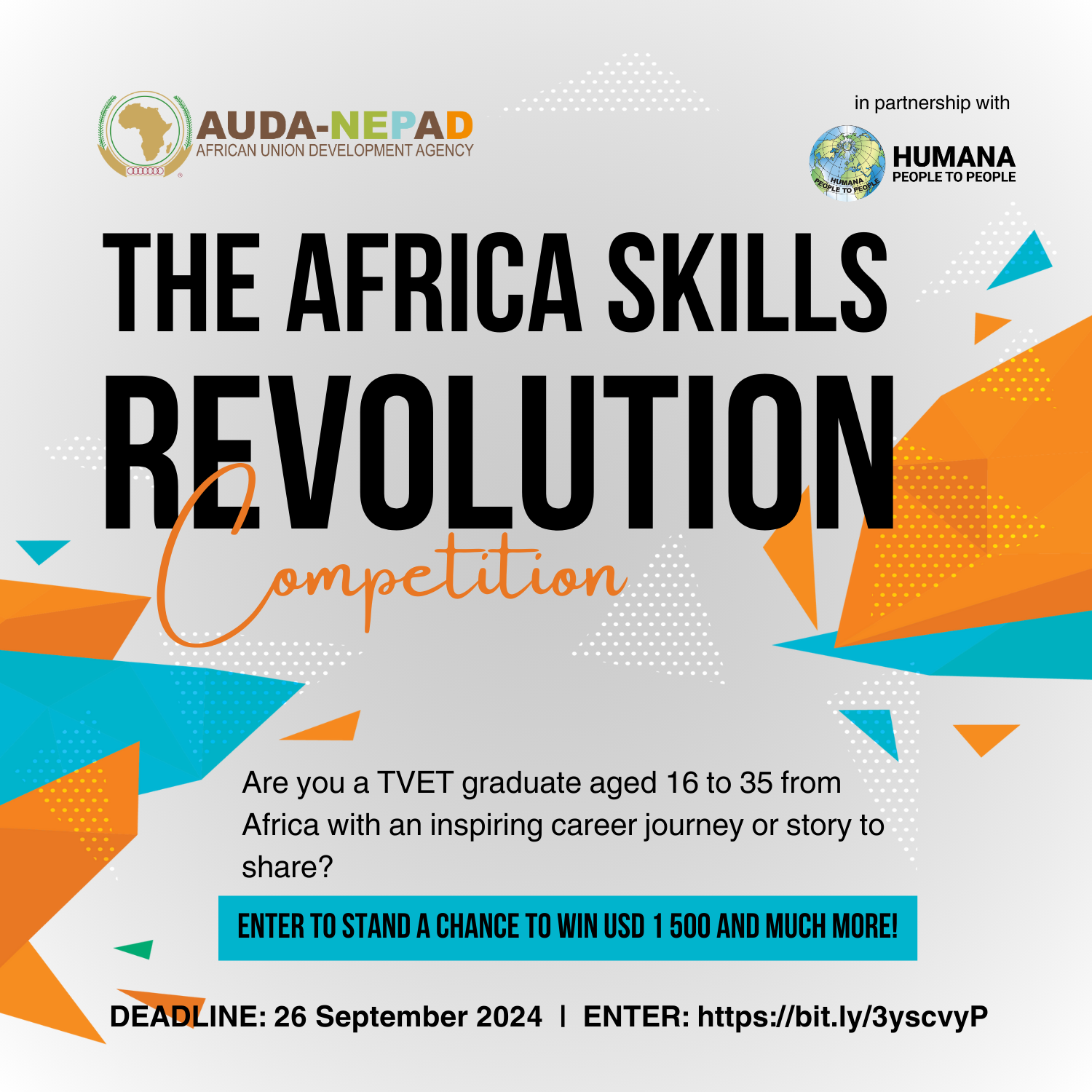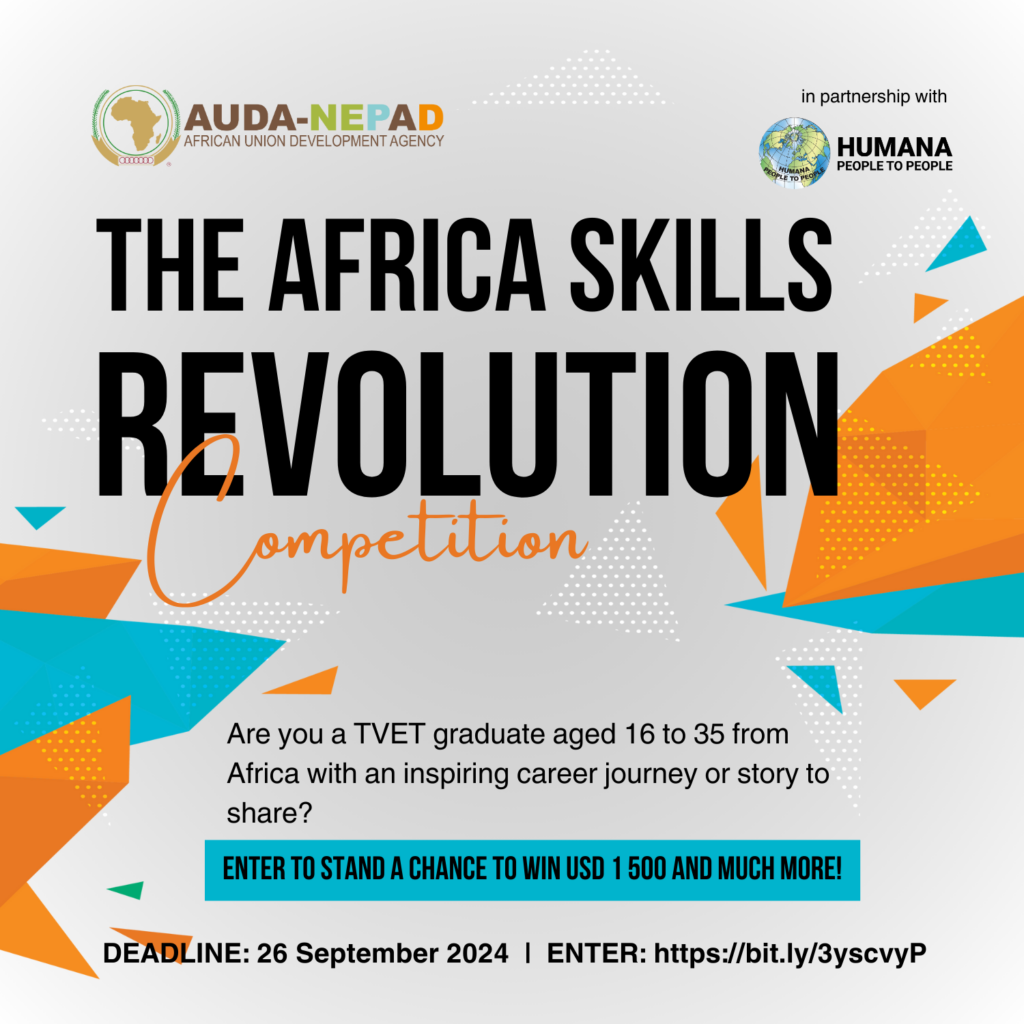By Ms. Nqobile Zwane, Skills Initiative for Africa (SIFA) Programme Officer, AUDA-NEPAD
Enter the Competition here, deadline 26 September 2024.
Benefits of TVET in Africa
Technical and Vocational Education and Training (TVET) is increasingly emerging as a transformative force in Africa’s educational landscape, focusing on practical, hands-on skills aligned with market demands. This approach has led to higher employment rates compared to university graduates, demonstrating TVET graduates’ strong entry into the job market. In Kenya and Nigeria, TVET graduates have better job prospects, largely due to their job-ready skills (African Development Bank, 2023).
Employers today prioritize individuals with specific, applicable skills, which TVET provides. Fields such as engineering and information technology benefit from TVET’s alignment with industry needs (World Bank, 2019), making its graduates more employable than those from traditional academic programs. In South Africa, for instance, TVET colleges are renowned for their focused training in various technical fields crucial to the economy, contributing to higher employment rates.
TVET also fosters entrepreneurship. Many students use their skills to start businesses, driving local economic growth. UNESCO reports provide examples of TVET graduates successfully launching small and medium-sized enterprises (SMEs), showcasing the sector’s role in promoting entrepreneurship and economic development (UNESCO-UNEVOC, 2023). This entrepreneurial drive is critical for Africa’s economic future, as it creates jobs and stimulates local and regional economies, as seen in Uganda, where many TVET graduates have established successful businesses.
TVET’s financial benefits are notable as well. TVET graduates often enjoy better earnings compared to their peers who have not undergone vocational training (International Labour Organization, 2021). In sectors such as construction and automotive, TVET graduates frequently achieve higher income levels than their counterparts from other educational backgrounds.
TVET is also instrumental in addressing skills shortages in critical sectors such as healthcare, technology, and construction. The African Union’s TVET Strategy underscores the importance of these programs in developing a skilled workforce to drive economic progress (AUDA-NEPAD, 2023). By targeting sectors with high demand for skilled labor, TVET programs help bridge the gap between available skills in the workforce and the needs of various industries. For instance, Ethiopia’s focus on TVET for the manufacturing sector has significantly improved productivity and boosted economic growth.
TVET Programs in Africa
Moreover, TVET programs are evolving to meet the demands of a changing job market. In Rwanda, institutions are incorporating advanced technology into their training programs, enhancing graduates’ adaptability and readiness for technological advancements (UNESCO-UNEVOC, 2023). This ensures that TVET graduates are equipped with both current and future-oriented skills.
International partnerships further enhance the quality of TVET. Tunisia’s collaboration with German institutions, for example, has improved the global competitiveness of its graduates by aligning TVET programs with international standards (African Development Bank, 2023). Such partnerships facilitate knowledge exchange and ensure that TVET programs meet global job market expectations.
Governments and industries across Africa are increasingly investing in TVET, recognizing its importance for economic development. Morocco’s “Maroc PME” program exemplifies how public-private partnerships can enhance TVET and prepare graduates for the job market (African Development Bank, 2023). This initiative demonstrates how aligning TVET with industry needs improves outcomes for TVET graduates and contributes to sector growth.
The Africa Skills Revolution
One notable initiative, the Africa Skills Revolution campaign, run by AUDA-NEPAD in partnership with Humana People to People, highlights and celebrates the outstanding skills of vocational students across Africa. The campaign focuses on listening to and including the voices of young people, recognizing that while TVET has great benefits for Africa’s future, its full potential can only be achieved by involving youth. The campaign provides a platform for students to showcase their talents and success, helping to build confidence and raise awareness about the value of vocational training. Through competitions, the campaign shares the stories of TVET graduates who have achieved significant career milestones, further demonstrating the impact of vocational education.
TVET also provides pathways for further education. Many TVET institutions have agreements with universities, enabling students to transfer credits and pursue higher education. In Zambia, graduates from Northern Technical College (NORTEC) can continue their academic journey at universities, supporting their educational and career development (International Labour Organization, 2021). This ability to transition to higher education demonstrates the flexibility of TVET programs and their role in supporting lifelong learning and career progression.
In conclusion, the Africa Skills Revolution campaign demonstrates the power of TVET in addressing the continent’s educational and economic challenges. By spotlighting success stories and advocating for the sector’s importance, the campaign helps shift perceptions and highlights the significant benefits of vocational training for African youth. Its impact on employment rates, entrepreneurship, and economic development underscores its value as a vital component of Africa’s education system. As TVET continues to evolve and adapt to changing demands, it promises to play an even more significant role in shaping Africa’s future, empowering individuals, and fostering sustainable development across the continent.
Enter the Competition here, deadline 26 September 2024.
References
- African Development Bank. (2023). Technical Education Transforming Rural Towns and Livelihoods in Kenya. Retrieved from Technical education transforming rural towns and livelihoods in Kenya | African Development Bank Group (afdb.org)
- International Labour Organization (ILO). (2021). Technical and Vocational Education and Training in Africa: A Review. Retrieved from wcms_881406.pdf (ilo.org)
- AUDA-NEPAD. (2023). Skilling Africa’s Informal Sector: Growth and Role of Technical and Vocational Education and Training. Retrieved from Skilling Africa’s Informal Sector for Growth: The Role of Technical and Vocational Education and Training | Wilson Center
- UNESCO-UNEVOC. (2023). Promising Practices in TVET. Retrieved from Innovative and Promising Practices (unesco.org)
- World Bank. (2019). Skills for Jobs in Sub-Saharan Africa. Retrieved from Open Knowledge Repository (worldbank.org)



This is a noble initiative for Africa. Just the last 2 weeks there was the Worldskills Competitions in Lyon, France. We need this for Zimbabwe my country, we were conspicuously absent in France.
TVETs acts as an engine of economic growth and provide a sustainable pathway for acquiring readily employable skills.
As a young boy growing up in Ghana, I’ve always been fascinated by the invisible forces that power the world—electricity. From the time I took apart a flashlight at 10 years old to figure out how it worked, my curiosity for Electrical Engineering ignited. When I completed SHS, I knew my passion for solving problems using technology would drive me further. My studies helped me realize that my potential is limitless, but I need support to develop my skills and make an impact.
Throughout high school, I worked hard in mathematics and physics, finding joy in understanding complex concepts and practical applications. I spent hours learning about circuits, energy distribution, and automation, and every challenge only strengthened my determination. I built small projects, from simple electrical boards to basic solar power systems, but I’ve always dreamed of something bigger—a future where I contribute to sustainable energy solutions for communities across the country.
Now, as I take the next step into university, I’m seeking opportunities to enhance my knowledge in Electrical Engineering. I’m committed to developing innovative solutions that help shape the future of energy, but I recognize that I need financial support, mentorship, and hands-on experience to bring this vision to life.
With the right support, I know I can grow from an aspiring student into a professional who makes meaningful contributions to our energy landscape. I am determined, passionate, and ready to take on the challenges ahead to turn my dreams into reality. Together, I believe we can make this happen
I am a beneficiary of TVET having been trained at Don Bosco Boys Town , a technical institute Targeting the less priviledged, equip them with technical skills and job linkages .
Am very self motivated youth and hardworking I did my hospitality management and food production with SOTT 2020 and this year studying cosmetology this year and very much ready for competition in this fields .